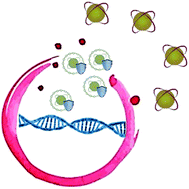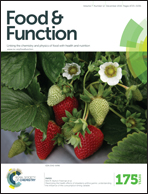Melatonin and hydroxytyrosol-rich wines influence the generation of DNA oxidation catabolites linked to mutagenesis after the ingestion of three types of wine by healthy volunteers
Abstract
The Mediterranean Diet (MD) has been proved to exert benefits with respect to the maintenance of the redox balance, and wine is a representative component. Bioactive compounds such as polyphenols, melatonin and hydroxytyrosol act as radical scavengers and regulate the oxidation status of organisms. Oxidative damage to DNA yields a large range of end products. The repair of oxidized DNA entails the removal of the useless bases and/or nucleotides as well as the release of circulating nucleotides and nucleosides. The current research aims to elucidate, for the first time, the DNA protection against oxidative stress provided by three types of red wine – relating it to the intake of bioactive compounds – after the intake of a serving of red wine/must by 18 healthy female volunteers during a short term double-blind, crossover and placebo-controlled study. The novelty of our work is to describe the importance of melatonin and hydroxytyrosol and its metabolites (from gut microflora) in comparison with polyphenols in a red wine matrix (excluding colon derivatives). The results show that the intake of red wine and must secondarily reduces oxidative stress and carcinogenesis due to their content of homovanillic acid, as measured by decreases in the plasmatic concentration of 8-hydroxy-2′deoxyguanosine, 8-hydroxyguanine, and 8-nitroguanosine. Moreover, the intake of wine appears to exert vasodilatory effects, mediated by the action of nitric oxide and increased plasma guanosine-3′-5′-cyclic monophosphate plasmatic levels, owing to the intake of wines higher in melatonin and homovanillic acid. Therefore, the results obtained in the present study revealed that polyphenols, despite being the major compounds in the red wine matrix, are not the most effective compounds protecting DNA from oxidative attack.


 Please wait while we load your content...
Please wait while we load your content...